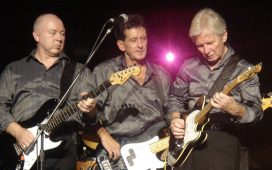Adrian Eagle remembers the moment he uploaded his Bob Marley cover to Facebook, in 2015.
“Tupac died at 25, and that was in my head. I was like, ‘I’m about to turn 26. I’ve got no time to waste here’,” he says.
“I’ll never forget: I did it at my goddaughter’s parents’ house in the city. I sat on my laptop, and when I posted it up I had no fear. Honest to god.”
It was an odd feeling for the Adelaide singer, born Adrian Naidu. Until then, his life had been consumed by dread. Scary storylines on television made him so paranoid that he once questioned his mother through the keyhole when she came home from work, terrified a murderer was impersonating her. As an overweight kid with a Maltese mum and a Fiji-Indian dad, he was a target for bullies, and scared of anyone mentioning his differences. So he quit school and closed himself off from the world – and filed away his musical aspirations too.
Sharing his music for the first time on Facebook “was like a freedom thing for me”, he says now. “I had beat myself up inside enough.”
And the world was waiting to hear it: 10 minutes after Adrian uploaded the cover of Redemption Song, the rapper 360 shared it with his 800,000-plus fans, with just one word: “Amazing”. After that, Naidu had nothing else to wait for.
When I meet Naidu in Melbourne, it’s a few days since the release of his long-awaited debut EP, Mama: a wise and tender collection of songs written in honour of the women who have emboldened and supported him. He was raised by a single mum, who comes up in conversation repeatedly.
We’re sitting on a bench outside a Collingwood cafe in a rare respite from rain. Growing up, he tells me, it was just the two of them at home, and they were perfectly paired: he was an expressive, musical kid obsessed with making noise. “And she’s two things – tone deaf and also partially deaf. And we lived next to a train station, so I could sing and rap as loud as I want,” he says, letting loose an infectious cackle.
His mother has never been to one of his shows – she has a bad back, so he’s waiting to book a theatre gig where she can sit comfortably – but her unconditional support is infused in every note on his soulful record.

Naidu describes his dad as an infrequent visitor, who reinforced the hate he already heaped upon himself and received from the world. “Originally, my negativity came from my father. When he would come in the house, he’d grill me about the way I looked. He’d be like, ‘you’re this, you’re that’,” he remembers, furrowing his brow and pointing his finger in mimicking accusation. While his father might not have been around much, Naidu carried him everywhere.
Naidu weighed 270kg at the time, and absorbed any messages that affirmed the way he already felt. “I still have shades of anxiety, but at that point it was extreme.” His mental health was dipping; he remembers thinking about suicide. “At that point in Adelaide, I had probably two friends. When I dropped out of high school, I told them that I moved to the country. I didn’t want to see anybody.”
He returns to that time in 17 Again, which became a surprise hit on Triple J in 2017: “Back when I was 17, I stopped trying to kill myself,” he sings. The song set him off on a trajectory that seemed impossible as a teenage shut-in. In it, he name-drops hip-hop act Hilltop Hoods; a year later, he was on stage collecting an Aria with them, for their song Clark Griswold; and in November, he’ll be joining the Adelaide stalwarts on a US tour.
Adelaide is an integral part of Naidu’s origin story. He’s a Crows supporter, and eagerly names the players who have reached out with love for his music, and one who came to a recent hometown show. His latest single Housing Trust is named for the South Australian public housing that put a roof over Naidu’s and his mother’s heads. “If diamonds come from pressure, I’ll glow,” he sings in his earnest, treacly voice, painting a vivid sonic watercolour of what their lives were like.
The “street-gospel” style of Naidu’s music extends beyond the songs, weaving into his conversation. At times, when he speaks, he drops the kind of inspirational aphorisms you might find stamped inside a travel journal or scrawled inside a congratulatory card.
But considering what he’s overcome on the road to finding his voice, I find myself listening without any cynicism. Still being here is success in itself – and anything Naidu is able to do with his time seems like an incredible bonus. “My first intention is for me. Music has to heal parts of me before it can do anything else,” he says. “I feel like the longer I get to live, the more I’ll be able to know myself.”
• Mama by Adrian Eagle is out now on Title Track. Adrian Eagle is touring Australia with Tones & I throughout September, and the US with Hilltop Hoods through November and December. He returns to Australia for Falls festival and his EP tour, which kicks off in January 2020.
• Crisis support services can be reached 24 hours a day: Lifeline 13 11 14;Suicide Call Back Service 1300 659 467; Kids Helpline 1800 55 1800; MensLine Australia 1300 78 99 78; Beyond Blue 1300 22 4636














